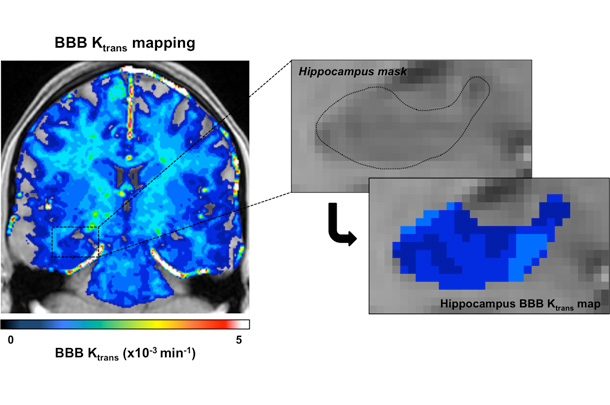USC neuroscientists have identified another piece to the puzzle of Alzheimer’s disease.
Researchers at Keck Medicine of USC used high-resolution imaging of the living human brain to show for the first time that the brain’s protective blood barrier becomes leaky with age, starting at the hippocampus, a critical learning and memory center that is damaged by Alzheimer’s disease.
The study indicates that it may be possible to use brain scans to detect changes in blood vessels in the hippocampus before irreversible damage leads to neurological disorders characterized by progressive loss of memory, cognition and learning.
The findings have broad implications related to conditions that are expected to affect 16 million Americans over age 65 by 2050, according to the latest figures from the Alzheimer’s Association. The research appears in the Jan. 21 edition of the peer-reviewed scientific journal Neuron.
“This is a significant step in understanding how the vascular system affects the health of our brains,” said Berislav Zlokovic, MD, PhD, director of the Zilkha Neurogenetic Institute at the Keck School of Medicine of USC, holder of the Mary Hayley and Selim Zilkha chair for Alzheimer’s Disease research and the study’s principal investigator.
Alzheimer’s is the most common type of dementia, a general term for loss of memory and other mental abilities. Postmortem studies of brains affected by Alzheimer’s show damage to the blood-brain barrier, a cellular layer that regulates entry of blood and pathogens into the brain. Why and when this damage occurs remains unclear, however.
In the Neuron study, Zlokovic’s research team examined contrast-enhanced brain images from 64 human subjects of various ages and found that early vascular leakage in the aging human brain occurs in the hippocampus, which normally shows the highest barrier properties compared to other brain regions. When controlled for age, the blood-brain barrier also showed more damage in the hippocampal area among people with dementia.
The researchers also looked at the subjects’ cerebrospinal fluid (CSF), which flows through the brain and spinal cord. Individuals who showed signs of mild dementia had 30 percent more albumin, a blood protein, in their CSF than age-matched control subjects, further indicating a leaky blood-brain barrier.
The cerebrospinal fluid of individuals with dementia also showed a 115 percent increase of a protein related to pericyte injury. Pericytes are cells that surround blood vessels and help maintain the blood brain barrier; previous research has linked pericytes to dementia and aging.
Study participants were recruited through the USC Alzheimer’s Disease Research Center and Huntington Medical Research Institutes. Other USC co-authors include Axel Montagne, Melanie Sweeney, Matthew Halliday, Abhay Sagare, Zhen Zhao, Arthur Toga, Collin Liu, Lilyana Amezcua, Helena Chui and Meng Law.
— Alison Trinidad


